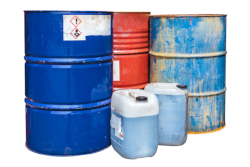Application of the Standard
The HCS applies to any chemical which is known to be present in the workplace in such a manner that employees may be exposed under normal conditions of use or in a foreseeable emergency.

- "Foreseeable emergency" means any potential occurrence such as, but not limited to, equipment failure, rupture of containers, or failure of control equipment which could result in an uncontrolled release of a hazardous chemical into the workplace.
- The phrase "known to be present" is important. If a hazardous chemical is known to be present by the chemical manufacturer or the employer, it is covered by the standard.
- "Hazardous chemical" means any chemical which is classified as a physical hazard or a health hazard, a simple asphyxiant, combustible dust, pyrophoric gas, or hazard not otherwise classified.
This includes chemicals to which employees may be exposed during normal operations or in a foreseeable emergency. This means that even though an employer was not responsible for the manufacture of the hazardous chemical, the employer has the responsibility for transmitting information about the hazardous chemical to his or her employees.
Employees, such as office workers or bank tellers who encounter hazardous chemicals only in non-routine, isolated instances are not covered. For example, an office worker who occasionally changes the toner in a copying machine would not be covered by the standard. However, an employee who operates a copying machine as part of her/his work duties would be covered by the provisions of the HCS.
Knowledge Check Choose the best answer for the question.
1-4. According to the HCS, what is a characteristic of a hazardous chemical?
You forgot to answer the question!
